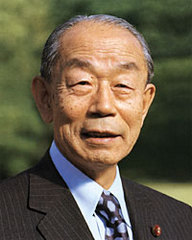Price of Your Life

(anne80b.jpg)

(tag007.jpg)

Kato, look at the above picture! What a disgusting scene it is. Are you talking about the price of a corpse?

Oh, no. I'm talking about the price of a human being in general.
Then how come you've pasted an abominable picture in the above?
Well ... to attract your attention. he, he, he, he, he, ...
This isn't a laughing matter, Kato. Why on earch are you talking about the price of your life and mine?
Good question. I borrowed the following book from Vancouver Public Library.

(lib30527.gif)
■“Actual Catalogue Page”

I see... this is a Japanese book, isn't it?

Actually, this is a translated version of "Justice" written by Michael J. Sandel. I read this book twice, then I borrowed the English version.

(sandel2.jpg)

(lib30527c.gif)
■“Actual Catalogue Page”

I think I've heard of the name of the author.

I know ... I know ... Professor Sandel is now world-famous.
Why is that?
Well ... His lectures are even aired in China... let alone in Japan.

(sandel3.jpg)
Putting a Price Tag of Life

So, you really enjoyed reading the book, didn't you?

You bet on that, Diane. As I jotted down as comment, reading the book is just like taking his famous undergraduate course "Justice" at Harvard University without the troublesome parts such as term papers and exams.
Oh, yeah?
Yes, I think he is an excellent educator who has unique and fascinating teaching methods with lucid and illustrating examples.
What's so good about the book?
Well ... once you get into his world, you would have to rethink your assumptions and question accepted ways of thinking. Then you would probably come up with a more awakening way of thinking as well as a more enriching way of living your life.
So, tell me, Kato, what impressed you so much.
Before I'll talk about it, read the following excerpt.
Exploding gas tanks

During the 1970s, the Ford Pinto was one of the best-selling subcompact cars in the United States.
Unfortunately, its fuel tank was prone to explode when another car collided with it from the rear.
More than five hundred people died when their Pinto bursts into flames ...
Compnay executives had conducted a cost-benefit analysis ...
To calculate the benefits to be gained by a safer gas tank, Ford estimated that 180 dearths and 180 burn injuries would result if no changes were made.
It then placed a monetary value on each life lost and injury suffered---$200,000 per life, and $67,000 per injury.
It added to these amounts the number and value of the Pintos likely to go up in flames, and calculated that the overall benefit of the safety improvement would be $49.5 million.
But the cost of adding an $11 device to 12.5 million vehicles would be $135.5 million.
So the company concluded that the cost of fixing the fuel tank was not worth the benefits of a safer car.
Upon learning of the study, the jury was outraged.
...
Perhaps they thought that $200,000 was egregiously low.
Ford had not come up with that figure on its own, but had taken it from a U.S. government agency.
In the early 1970s, the National Highway Traffic Safety Administration had calculated the cost of a traffic fatality.
Counting future productivity losses, medical costs, funeral costs, and the victim's pain and suffering, the agency arrived at $200,000 per fatality.
SOURCE: pp. 43-44 "Justice"
by Michael Sandel

During the 1970s, the Ford Pinto was one of the best-selling subcompact cars in the United States.
Unfortunately, its fuel tank was prone to explode when another car collided with it from the rear.
More than five hundred people died when their Pinto bursts into flames ...
Compnay executives had conducted a cost-benefit analysis ...
To calculate the benefits to be gained by a safer gas tank, Ford estimated that 180 dearths and 180 burn injuries would result if no changes were made.
It then placed a monetary value on each life lost and injury suffered---$200,000 per life, and $67,000 per injury.
It added to these amounts the number and value of the Pintos likely to go up in flames, and calculated that the overall benefit of the safety improvement would be $49.5 million.
But the cost of adding an $11 device to 12.5 million vehicles would be $135.5 million.
So the company concluded that the cost of fixing the fuel tank was not worth the benefits of a safer car.
Upon learning of the study, the jury was outraged.
...
Perhaps they thought that $200,000 was egregiously low.
Ford had not come up with that figure on its own, but had taken it from a U.S. government agency.
In the early 1970s, the National Highway Traffic Safety Administration had calculated the cost of a traffic fatality.
Counting future productivity losses, medical costs, funeral costs, and the victim's pain and suffering, the agency arrived at $200,000 per fatality.
SOURCE: pp. 43-44 "Justice"
by Michael Sandel

I think, $200,000 is too low for the price of my life.

I think so, too.
Besides, I don't like an idea to put a price tag on human life, which is immeasurable in the first place, I suppose.
I agree with you, Diane, but if you perform a cost-benefit analysis, you would have to come up with the price of human life.
Even if you somehow come up with a price, it is not possible to measure and compare all values and goods on a single scale.
I understand what you mean, Diane. Here's an interesting episode. Read the following passage.
St. Anne's girls

(anne03c.jpg)
In the 1970s, when I was a graduate student at Oxford, there were separate colleges for men and women.
The women's colleges had parietal rules against male guests staying overnight in women's rooms.
These rules were rarely enforced and easily violated, or so I was told.
Most college officials no longer saw it as their role to enforce traditional notions of sexual morality.
Pressure grew to relax these rules, which became a subject of debate at St. Anne's College, one of the all-women colleges.
Some older women on the faculty were traditionalists.
They opposed allowing male guests, on conventional moral grounds; it was immoral, they thought, for unmarried young women to spend the night with men. But times had changed, and the traditionalists were embarrased to give the real grounds for their objection.
So they translated their arguments into utilitarian terms.
"If men stay overnight," they argued, "the costs to the college will increase."
How, you might wonder? "Well, they'll want to take baths, and that will use more hot water."

(anne82.jpg)
Furthermore, they argued, "we will have to replace the mattresses more often."
The reformers met the traditionalists' arguments by adopting the following compromise: Each woman could have maximum of three overnight guests each week, provided ech guest paid fifty pence per night to defray the costs to the college.
The next day, the headline in the "Guardian" read, "St. Anne's Girls, Fifty Pence a Night."
The language of virtue had not translated very well into the language of utility. Soon thereafter, the parietal rules were waived altogether, and so was the fee.
(Pictures from Denman Library)
SOURCE: pp. 47-48 "Justice"
by Michael Sandel

(anne03c.jpg)
In the 1970s, when I was a graduate student at Oxford, there were separate colleges for men and women.
The women's colleges had parietal rules against male guests staying overnight in women's rooms.
These rules were rarely enforced and easily violated, or so I was told.
Most college officials no longer saw it as their role to enforce traditional notions of sexual morality.
Pressure grew to relax these rules, which became a subject of debate at St. Anne's College, one of the all-women colleges.
Some older women on the faculty were traditionalists.
They opposed allowing male guests, on conventional moral grounds; it was immoral, they thought, for unmarried young women to spend the night with men. But times had changed, and the traditionalists were embarrased to give the real grounds for their objection.
So they translated their arguments into utilitarian terms.
"If men stay overnight," they argued, "the costs to the college will increase."
How, you might wonder? "Well, they'll want to take baths, and that will use more hot water."

(anne82.jpg)
Furthermore, they argued, "we will have to replace the mattresses more often."
The reformers met the traditionalists' arguments by adopting the following compromise: Each woman could have maximum of three overnight guests each week, provided ech guest paid fifty pence per night to defray the costs to the college.
The next day, the headline in the "Guardian" read, "St. Anne's Girls, Fifty Pence a Night."
The language of virtue had not translated very well into the language of utility. Soon thereafter, the parietal rules were waived altogether, and so was the fee.
(Pictures from Denman Library)
SOURCE: pp. 47-48 "Justice"
by Michael Sandel

Kato, this is a farce, isn't it?

Yes, I guess so.
Have you quoted the above passage for the laugh of the day?
No, of course, not. Actually, I have an interesting episode to share with you, Diane.
Tell me.
In the late 1970s, I visited Jane at St. Anne's College.

(anne02c.jpg)

(anne80b.jpg)

Are you saying, the girl in the above pictures is Jane?

Yes, she is.
She looks like June, doesn't she?
Jane is June's cousin.
I see. What happened at the college?
Naturally I stayed overnight in her room as a male guest.

(anne82.jpg)

Are you saying, Kato, you stay overnight in the above room with Jane?

Yes, I am.
So, what happened?
Read the following episode.

(jane001.jpg)
Kato, what ... what do you think you're trying to do here ... here in my bed?

Well ... I wanna make love.
Are you serious?
Yes, I am.
Kato, I told you I believe in Immanuel Kant.
I know.
Then you should know that Immanuel Kant was againt casual sex. So am I.
Do you really believe in Kant?
Yes, I do. Kant said that casual sex is objectionable.
Why is that?
...'Cause it is all about the satisfaction of sexual desire, not about respect for the humanity of one's partner. The desire which you have for me is not directed toward me as a human being. That I am a human being is of no concern to you; you're intereted in me as the object of your desire.
Who told you so?
Kant did.
I've never told you that I'm interested in you as the object of my desire. Listen to me, Jane! I love you because you're like Hypatia in the ancient Alexandoria. You're quite intelligent, compassionate, and good-natured, and I've got tons of respect for the humanity of your person.
Even if you insists on that, I still reject your advance.
Why is that?
Kant says that only sex within marriage can avoid degrading humanity. Only when two persons give each othre the whole of themselves, and not merely the use of their sexual capacities, can sex be other than objectifying. Only when both partners share with each other their person, body and soul, for good and ill and in every respect, can their sexuality leads to a true union of human beings.
Jane, are you saying, every marriage actually brings about a union of that kind?
No, Kant didn't say that, but sexual relations outside of marriage involve nothing more than sexual gratification.
Who said so?
Kant did. The categorical imperative tells us to treat everyone with respect, as an end in itself.
So, believe me, Jane, I'm treating you with respect and love as a rational human being---not merely the object of my desire.
But I believe in Immanuel Kant.
Jane, who is more important to you---Kant or Kato?
I'm very sorry, Kato. I go for Kant.

So, Kato, you didn't make love with Jane, did you?

No, not really, I didn't know she is such an opinionated, dogmatic and stone-headed woman.
So what about the price of your life and mine?
Oh yes ... that's the thing I wanna talk about with you. There are things you can't buy with money.
Like what?
Like your life or Jane's love.
Are you serious, Kato?
Yes, I'm dead-serious. After reading the above book, I've just concluded that you just can't come up with the dollar value of a human life?
Why is that?
...'Cause human life outweighs the earth.
Kato, do you really believe that?
Yes, I do.
How on earth have you come up with the idea?
Well ... let me tell you this incident, which took place on September 28, 1977. The Douglas DC-8, en route from Paris to Haneda Airport in Tokyo with 156 people on board, stopped in Mumbai, India. Shortly after taking off from Mumbai, five armed members of the Japanese Red Army, led by Osamu Maruoka, hijacked the aircraft and ordered it flown to Dhaka, Bangladesh.
No kidding!
I'm not joking nor jesting. At Dhaka, the hijackers took the passengers and crew hostage, demanding $6 million and the release of nine imprisoned Red Army members.
Then what happened?
On October 1, 1977, Prime Minister Takeo Fukuda announced that the Japanese government would accept the hijackers' demands.

(fukuda02.jpg)

Really? Did he accepte their demands?

Oh yes, Mr. Fukuda told the reporters, "human life outweighs the earth."
Japanese Leftist Terror Footage 3
Japanese Leftist Terror Footage 2

Six of the imprisoned Red Army members were then released.

Then what happened?
A chartered Japan Airlines flight carried the money and the six released JRA members to Dhaka, where the exchange took place on October 2. The hijackers released 118 passengers and crew members. On October 3, they flew to Kuwait City and Damascus, where they released 11 more hostages. Finally, the aircraft was flown to Algeria, where it was impounded by authorities and the remaining hostages were freed.
So, no casualties.
No, there are no casualties. I admire and respect Mr. Fukuda and believe that human life indeed outweighs the earth.

【Himiko's Monologue】

The first recorded aircraft hijack took place on February 21, 1931, in Arequipa, Peru.
Byron Rickards, flying a Ford Tri-Motor, was approached on the ground by armed revolutionaries.
He refused to fly them anywhere.
After a 10-day standoff Rickards was informed that the revolution was successful and he could go in return for giving one group member a lift to Lima.
I'm glad to hear that there are no casualties.
In any case, I hope Kato will write another interesting article soon.
So please come back to see me.
Have a nice day!
Bye bye ...


The first recorded aircraft hijack took place on February 21, 1931, in Arequipa, Peru.
Byron Rickards, flying a Ford Tri-Motor, was approached on the ground by armed revolutionaries.
He refused to fly them anywhere.
After a 10-day standoff Rickards was informed that the revolution was successful and he could go in return for giving one group member a lift to Lima.
I'm glad to hear that there are no casualties.
In any case, I hope Kato will write another interesting article soon.
So please come back to see me.
Have a nice day!
Bye bye ...


If you've got some time,
Please read one of the following artciles:

(juneswim.jpg)
■"Covent Garden"
■"Fatal Relation"
■"Notre Dame"
■"Anne Frank"
■"Biker Babe"
■"Diane Girdles the Globe"
■"Diane in Casablanca"
■"Infidelity Neighbourhood"
■"Forest Bathing"
■"Enjoy Ramen!"
■"Sex, Violence, Love"

■"Halifax to Vancouver"
■"A Thread of Destiny"
■"Fujiyama Geisha"
■"Beaver Lake"
■"God is Near!"
■"Holy Cow@Rose Garden"
■"Vancouver Earthquake"
■"Birthplace"

■"KIFF"
■"You Love Japan, eh?"
■"Eight Bridges"
■"First Love"
■"Fright on Flight"
■"Boy's Movie"
■"From Summer to Eternity"
■"Sōseki & Glenn Gould"

(biker302.jpg)
■"Dream Dream Dream"
■"In Search of Your Footprint"
■"Little Night Music"
■"Merry X'mas"
■"Happy New Year!"
■"Long live Diane!"
■"Mona Lisa"
■"Flu Shot"
■"Selfish TD Bank"
■"Talk with Mozart"

■"Bliss for Diane!"
■"Romantic Bohemian"
■"TD Bank or Mozart?"
■"Diane@TD Bank"
■"Tear Jerker"
■"Diane in Chorus Line"
■"Pork or Friend?"
■"Easter Bloopers"
■"Beauty is Heart-deep"
■"Romance@South Pacific"
■"Art Gallery"
■"Diane Hypatia"
■"Cherry and Silk"


Hi, I'm June Adams.
The above hijacking incident contrasted Europe and the United States' approach of non-negotiation with terrorists to Japan's approach of appeasing terrorists if necessary.
Shortly after the incident, Japan's National Police Agency established a Special Assault Team to deal with future acts of terrorism.
Several of the Japanese Red Army radicals involved in the hijacking have yet to be apprehended and their current whereabouts are unknown.
Maruoka escaped and remained a fugitive until 1987 when he was arrested in Tokyo after entering Japan on a forged passport.
Given a life sentence, he died in prison on 29 May 2011.
Another of the hijackers, Jun Nishikawa, eventually returned to Japan, was arrested, convicted, and sentenced to life imprisonment.

ところで、愛とロマンに満ちた
レンゲさんのお話をまとめて
『レンゲ物語』を作りました。
もし、レンゲさんの記事をまとめて読みたいならば、
次のリンクをクリックしてくださいね。
■『愛とロマンのレンゲ物語』

■『軽井沢タリアセン夫人 - 小百合物語』
とにかく、今日も一日楽しく愉快に
ネットサーフィンしましょうね。
じゃあね。







0 件のコメント:
コメントを投稿